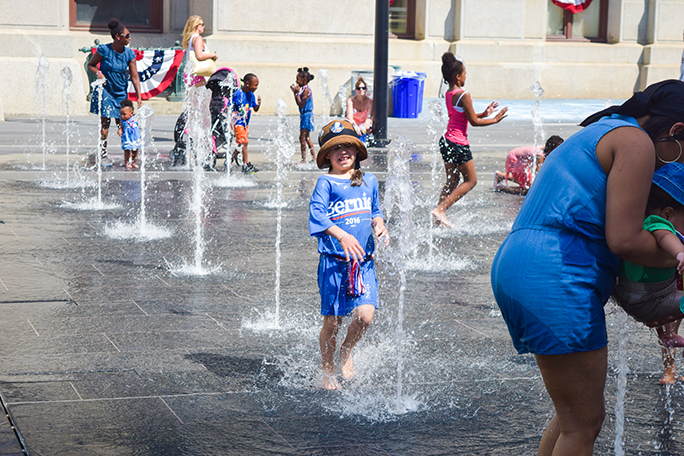
Philadelphia – The third day of the Democratic National Convention was defined by the official nomination of Hillary Clinton as the Democratic nominee, finally and totally ending the meteoric rise of Vermont Senator Bernie Sanders.
Activists came together all over the city, congregating at City Hall and in FDR park. Most of them came to support Bernie, and to pay their respects to a campaign that galvanized the nation in a way that few have in recent memory.
The Sanders campaign was fueled by small individual donations coming from a diverse group of passionate supporters. As Sanders is quick to remind the nation, the average donation to his campaign was a mere $27, and these small donations amounted to 59% of his total campaign funding. By comparison, 22% of Clinton’s funding came from individual donors giving $200 or less.
Bernie was able to excite a generation of millennial voters that the media has deemed politically apathetic, and he has brought hope to a nation so desperately in need. Some would say that is all over now that he has lost the nomination, but many of his supporters disagree.
In honor of the end of a campaign that inspired so many people, I took to the streets of downtown Philadelphia to ask Bernie supporters a simple question: Who is Bernie Sanders?











Tiffany Graves is a lawyer in Tulsa, OK who has a private practice and two children. That keeps her very busy, but she makes time to campaign for Bernie Sanders. She came to Philadelphia as a Bernie delegate, but doesn’t consider herself a part of the “Bernie or Bust” contingent. I interviewed Graves at a Bernie rally in downtown Philadelphia, and she articulated the emotions surrounding the day after Clinton’s nomination:
I remember very clearly the moment that I decided to get involved with the Sanders campaign. I was in England with my family, and I got a link to a Youtube video about Bernie. I was amazed, I had never seen a candidate as honest as Bernie Sanders. I immediately decided to get involved.
When my husband and I first started knocking doors in Tulsa, nobody knew about Bernie Sanders. As the primary season progressed, we saw his support grow and we saw more people having that same moment that I remember having, learning about his message. It’s hard not to get personally invested in that. We were all giving so much time, and we felt like we were really a part of it.
On the day of our primary, March 1st, we had a viewing party. I remember that when it came on TV and he had won by 10.5% we were all so happy. People were hugging, crying, just overjoyed. It didn’t just feel like his victory, it felt like our victory too.
I don’t think that Bernie losing the nomination changes anything. I think there is a select group of people that feel like the movement ends with Bernie, but I don’t agree, and I don’t think Bernie would agree. I think he entered this race to inspire a new generation of progressives, and I think that’s what he has done. It’s definitely bittersweet, but this political revolution is far from over.
Whitman College students can take solace in the fact that we are the very political revolution on which Bernie built his campaign. Our ability to shoulder the burden of fixing this broken democracy will define the extent to which we benefit from a more equitable system.
